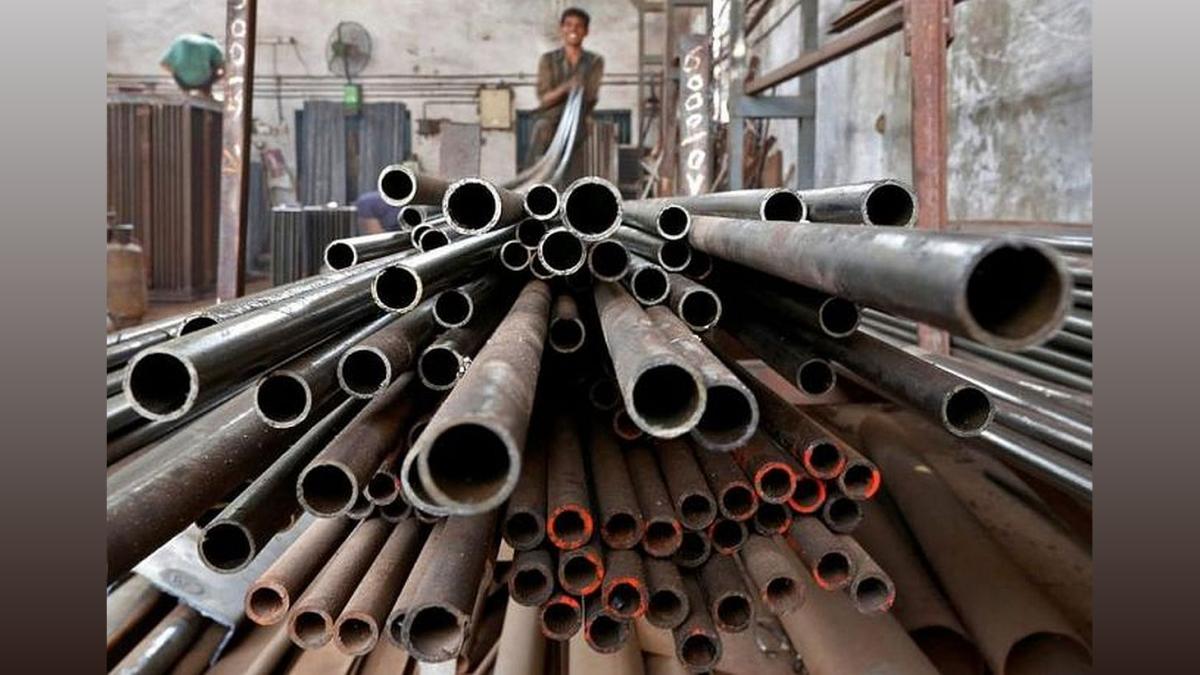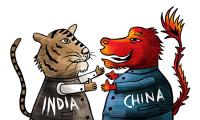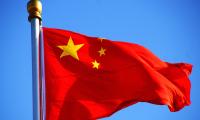Anti-Subsidy Duty on Steel Pipes from China, Vietnam Extended
India's DGTR recommends extending anti-subsidy duty on welded stainless steel pipes and tubes from China and Vietnam, citing potential injury to domestic industry.

Photograph: Amit Dave/Reuters
New Delhi, Jun 24 (PTI) The commerce ministry's investigation arm DGTR has recommended the continuation of countervailing or anti-subsidy duty on welded stainless steel pipes and tubes from China and Vietnam to guard domestic players.
In a notification, the Directorate General of Trade Remedies (DGTR) has said that there is a likelihood of injury to the domestic industry in the event of cessation of present countervailing duty on the imports from these two nations.
"The authority has reached a conclusion that the duty imposed on subject goods is required to be extended further...The authority recommends extension of countervailing duties on imports of the product under consideration," the DGTR has said.
The directorate has recommended a duty of up to 29.88 per cent on the product.
The finance ministry takes the final decision to impose this duty.
In its probe, the DGTR has concluded that in case of cessation of anti-subsidy duty, the domestic industry is likely to incur financial losses.
Chinese producers have excess capacities for the product and the demand for stainless steel has declined in China.
"The additional capacities of the Chinese producers are likely to be used for exporting the subject goods to India once the duties ceased to exist," it added.
Domestic players had filed the application in July 2023 for initiation of a sunset review of anti-subsidy duties imposed earlier and seeking continuation of the duties against imports of Welded stainless steel tubes and pipes from China and Vietnam.
The revenue department had imposed the duty in September 2019.
Subsidised exports impact the price of that product in the importing country, hitting the margins and profits of manufacturing firms.
According to global trade norms, a country is allowed to impose countervailing or anti-subsidy duties on such imports to provide a level playing field to domestic industry.
In a notification, the Directorate General of Trade Remedies (DGTR) has said that there is a likelihood of injury to the domestic industry in the event of cessation of present countervailing duty on the imports from these two nations.
"The authority has reached a conclusion that the duty imposed on subject goods is required to be extended further...The authority recommends extension of countervailing duties on imports of the product under consideration," the DGTR has said.
The directorate has recommended a duty of up to 29.88 per cent on the product.
The finance ministry takes the final decision to impose this duty.
In its probe, the DGTR has concluded that in case of cessation of anti-subsidy duty, the domestic industry is likely to incur financial losses.
Chinese producers have excess capacities for the product and the demand for stainless steel has declined in China.
"The additional capacities of the Chinese producers are likely to be used for exporting the subject goods to India once the duties ceased to exist," it added.
Domestic players had filed the application in July 2023 for initiation of a sunset review of anti-subsidy duties imposed earlier and seeking continuation of the duties against imports of Welded stainless steel tubes and pipes from China and Vietnam.
The revenue department had imposed the duty in September 2019.
Subsidised exports impact the price of that product in the importing country, hitting the margins and profits of manufacturing firms.
According to global trade norms, a country is allowed to impose countervailing or anti-subsidy duties on such imports to provide a level playing field to domestic industry.
You May Like To Read
TODAY'S MOST TRADED COMPANIES
- Company Name
- Price
- Volume
- Vodafone Idea L
- 6.96 ( -1.69)
- 32087619
- Spicejet Ltd.
- 45.48 ( -6.38)
- 24487576
- Srestha Finvest
- 0.56 (+ 3.70)
- 15767473
- G G Engineering
- 1.00 ( 0.00)
- 13488004
- YES Bank Ltd.
- 16.20 (+ 0.31)
- 11982994






 © 2025 Rediff.com India Limited. All rights reserved.
© 2025 Rediff.com India Limited. All rights reserved.